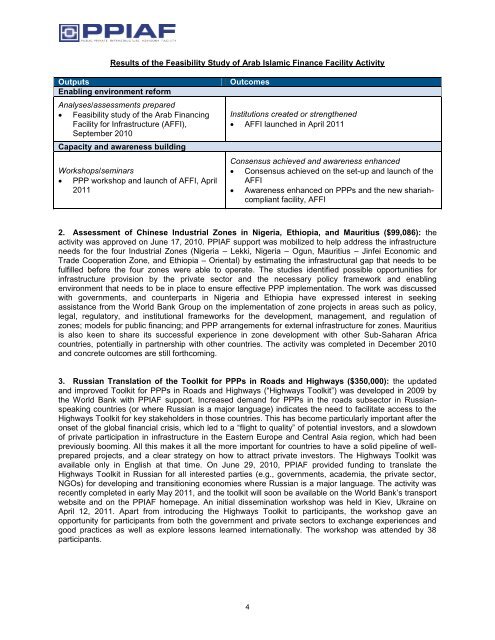PMR cover.psd - ppiaf
PMR cover.psd - ppiaf
PMR cover.psd - ppiaf
Create successful ePaper yourself
Turn your PDF publications into a flip-book with our unique Google optimized e-Paper software.
Results of the Feasibility Study of Arab Islamic Finance Facility Activity<br />
Outputs Outcomes<br />
Enabling environment reform<br />
Analyses/assessments prepared<br />
� Feasibility study of the Arab Financing<br />
Facility for Infrastructure (AFFI),<br />
September 2010<br />
Capacity and awareness building<br />
Workshops/seminars<br />
� PPP workshop and launch of AFFI, April<br />
2011<br />
Institutions created or strengthened<br />
� AFFI launched in April 2011<br />
Consensus achieved and awareness enhanced<br />
� Consensus achieved on the set-up and launch of the<br />
AFFI<br />
� Awareness enhanced on PPPs and the new shariahcompliant<br />
facility, AFFI<br />
2. Assessment of Chinese Industrial Zones in Nigeria, Ethiopia, and Mauritius ($99,086): the<br />
activity was approved on June 17, 2010. PPIAF support was mobilized to help address the infrastructure<br />
needs for the four Industrial Zones (Nigeria – Lekki, Nigeria – Ogun, Mauritius – Jinfei Economic and<br />
Trade Cooperation Zone, and Ethiopia – Oriental) by estimating the infrastructural gap that needs to be<br />
fulfilled before the four zones were able to operate. The studies identified possible opportunities for<br />
infrastructure provision by the private sector and the necessary policy framework and enabling<br />
environment that needs to be in place to ensure effective PPP implementation. The work was discussed<br />
with governments, and counterparts in Nigeria and Ethiopia have expressed interest in seeking<br />
assistance from the World Bank Group on the implementation of zone projects in areas such as policy,<br />
legal, regulatory, and institutional frameworks for the development, management, and regulation of<br />
zones; models for public financing; and PPP arrangements for external infrastructure for zones. Mauritius<br />
is also keen to share its successful experience in zone development with other Sub-Saharan Africa<br />
countries, potentially in partnership with other countries. The activity was completed in December 2010<br />
and concrete outcomes are still forthcoming.<br />
3. Russian Translation of the Toolkit for PPPs in Roads and Highways ($350,000): the updated<br />
and improved Toolkit for PPPs in Roads and Highways (―Highways Toolkit‖) was developed in 2009 by<br />
the World Bank with PPIAF support. Increased demand for PPPs in the roads subsector in Russianspeaking<br />
countries (or where Russian is a major language) indicates the need to facilitate access to the<br />
Highways Toolkit for key stakeholders in those countries. This has become particularly important after the<br />
onset of the global financial crisis, which led to a ―flight to quality‖ of potential investors, and a slowdown<br />
of private participation in infrastructure in the Eastern Europe and Central Asia region, which had been<br />
previously booming. All this makes it all the more important for countries to have a solid pipeline of wellprepared<br />
projects, and a clear strategy on how to attract private investors. The Highways Toolkit was<br />
available only in English at that time. On June 29, 2010, PPIAF provided funding to translate the<br />
Highways Toolkit in Russian for all interested parties (e.g., governments, academia, the private sector,<br />
NGOs) for developing and transitioning economies where Russian is a major language. The activity was<br />
recently completed in early May 2011, and the toolkit will soon be available on the World Bank’s transport<br />
website and on the PPIAF homepage. An initial dissemination workshop was held in Kiev, Ukraine on<br />
April 12, 2011. Apart from introducing the Highways Toolkit to participants, the workshop gave an<br />
opportunity for participants from both the government and private sectors to exchange experiences and<br />
good practices as well as explore lessons learned internationally. The workshop was attended by 38<br />
participants.<br />
4

















